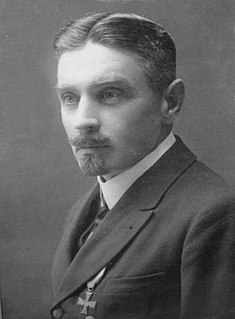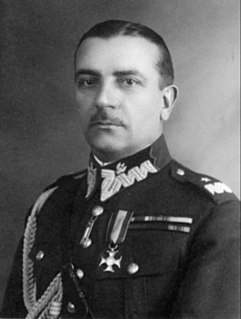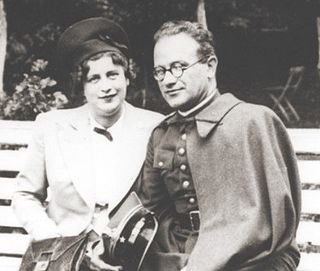 W
WZbigniew Juliusz Babiński was a Polish military and sports aviator.
 W
WJózef Baran-Bilewski was a Polish athlete. He competed in the men's discus throw at the 1928 Summer Olympics. He was killed during World War II.
 W
WLeon Billewicz was a Polish officer and a General of the Polish Army. He was murdered during the Katyń massacre.
 W
WBronisław Bohatyrewicz of Ostoja (1870–1940) was a Polish military commander and a general of the Polish Army. Murdered during the Katyn massacre, Bohatyrewicz was one of the Generals whose bodies were identified by forensic scientists of the Katyn Commission during the 1943 exhumation.
 W
WEugeniusz Budzyński was a Polish balneologist, neurologist, internist and major in the Polish Army. He was killed in the Katyn massacre.
 W
WAlexandre Chkheidze, also known under his Polish name of Aleksander Czcheidze (1878–1940), was a Polish-Georgian military officer. He served with the rank of Colonel in the armed forces of the Democratic Republic of Georgia during the short period of its independence following World War I. Following the Bolshevik occupation of his country, Chkheidze migrated to Poland, where he received further training in the Higher War School.
 W
WCyryl Czarkowski-Golejewski was an aristocratic Polish landowner and wine producer. Following the German and Soviet invasions of Poland in September 1939 the Czarkowski-Golejewskis were thrown out of their home at Wysuczka. In April 1940 Cyryl Czarkowski-Golejewski became a victim of the Katyn massacre.
 W
WRear Admiral Xawery Stanisław Czernicki (1882–1940) was a Polish engineer, military commander and one of the highest-ranking officers of the Polish Navy. Considered one of the founders of Polish Navy's logistical services, he was murdered by the Soviet NKVD during the Katyn massacre.
 W
Wâ Włodzimierz Józef Godłowski was a Polish neurologist and psychologist. A professor of the Stefan Batory University in Wilno (Vilnius), he was also an officer in the Polish Army during the German and Soviet invasion of Poland. He was made a prisoner of war by the Soviets in 1939 and was murdered in the Katyn massacre in 1940.
 W
WStanisław Haller de Hallenburg was a Polish politician and general who was murdered in the Katyn massacre. He was a cousin of General Józef Haller von Hallenburg.
 W
WWładysław Jędrzejewski was a General of the Polish Army, who was probably murdered by the NKVD in Lwów, in March 1940. He fought in several conflicts, including World War I and the Invasion of Poland.
Zdzisław Szczęsny Kawecki-Gozdawa was a Polish horse rider who competed in the 1936 Summer Olympics.
 W
WAlexander Marek Kowalski was a Polish ice hockey defenceman who competed in the 1928 Winter Olympics and in the 1932 Winter Olympics.
 W
WTadeusz Kowalski was a Polish military officer and sportsman.
 W
WJanina Antonina Lewandowska was a Polish World War II pilot murdered in the Katyn massacre by Soviet forces.
 W
WJózef Marcinkiewicz was a Polish mathematician.
 W
WHenryk Minkiewicz was a Polish socialist politician and a general of the Polish Army. Former commander of the Border Defence Corps, he was among the Polish officers murdered in the Katyń massacre.
 W
WAdam Obrubański was a Polish football player and official, also a graduate of Kraków’s renowned Jagiellonian University.
 W
WKazimierz Orlik-Łukoski was a Polish military commander and one of the Generals of the Polish Army murdered by the Soviet Union in the Katyń massacre of 1940.
 W
WKonstanty Plisowski of Odrowąż was a Polish general and military commander. He was the Commander in the battle of Jazłowiec and the battle of Brześć Litewski. He was murdered on Stalin's orders in the Katyn massacre.
 W
WRudolf Prich was a Polish military officer and a major general of the Polish Army. He was among the Polish officers who were murdered by the Soviet Union during the Katyń massacre.
 W
WMarian Antoni Güntner, better known as Marian Rentgen, was a Polish actor and director. He was active in theatre and film between 1913 and 1938. He was killed in the Katyn massacre in April 1940.
 W
WWładysław Sebyła (1902–1940) was a Polish poet, a member of the Kwadryga (Four-in-Hand) literary group, which also included Konstanty Ildefons Gałczyński and Stefan Flukowski. He was executed in Kharkiv.
 W
WFranciszek Jozef Sikorski was a Polish engineer, General brygady of the Polish Army and a victim of the Katyn massacre.
 W
WLeonard Wilhelm Skierski was a Polish military officer and a general of the Imperial Russian Army and then the Polish Army. A veteran of World War I and the Polish-Bolshevik War, he was one of fourteen Polish generals and one of the oldest military commanders to be murdered by the NKVD in the Katyn massacre of 1940.
 W
WPiotr Skuratowicz was a Polish military commander and a General of the Polish Army. A renowned cavalryman, he was arrested by the NKVD and murdered in the Katyn massacre.
 W
WBrigadier General Mieczysław Makary Smorawiński (1893–1940), was a Polish military commander and officer of the Polish Army. He was one of the Polish generals identified by forensic scientists of the Katyn Commission as the victim of the Soviet Katyn massacre of 1940.
 W
WStefan Lech Sokołowski Gozdawa coat of arms was a Polish mathematician, climber and porucznik of artillery in Polish Land Forces. Lwów Eaglet (1919). Doctor of mathematical sciences. Victim of Katyn massacre.
 W
WAdam Solski was a soldier of the Polish Legions of World War I, a participant in the Polish–Soviet War, and a major in the Polish Army in the interwar period. Solski fought in the 1939 Invasion of Poland. Captured by the Red Army during the Soviet invasion of Poland, he was murdered in the Katyn massacre, on April 9, 1940.
 W
WBaruch or Boruch Steinberg was a Polish rabbi and military officer. He was Chief Rabbi of the Polish Army during German invasion of Poland in 1939 and was murdered in the Katyn massacre in April 1940.
 W
WStanisław Urban was a Polish rower who competed in the 1928 Summer Olympics and in the 1932 Summer Olympics.
 W
WAlojzy Wir-Konas was a Polish military commander and the Colonel in the Polish Army. Serving as Divisional Commander during the Invasion of Poland, he was murdered in the Katyn massacre.